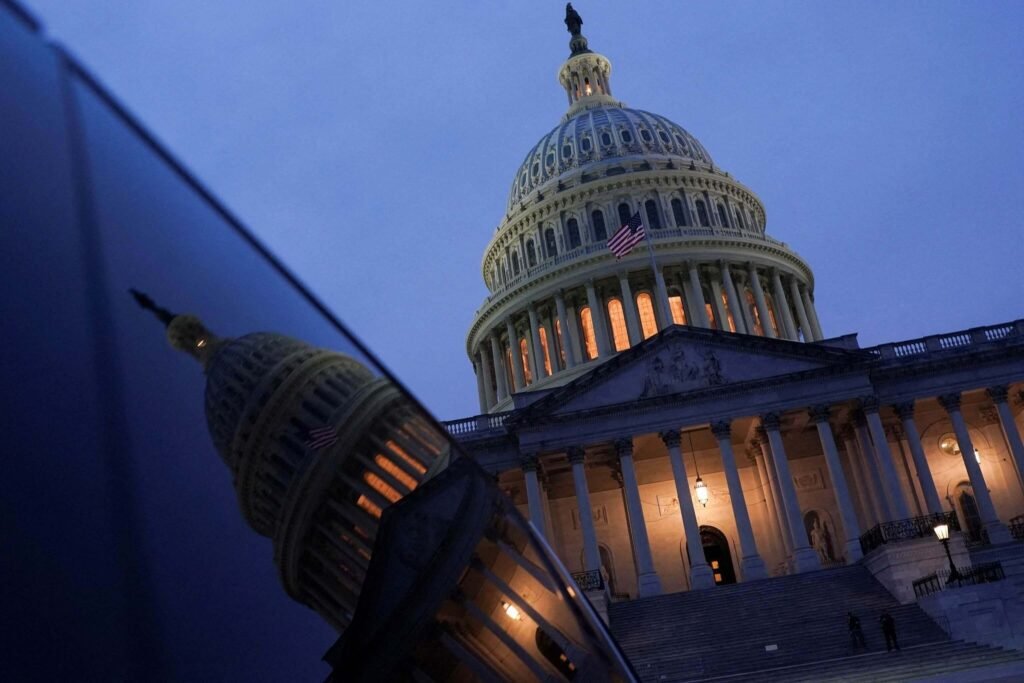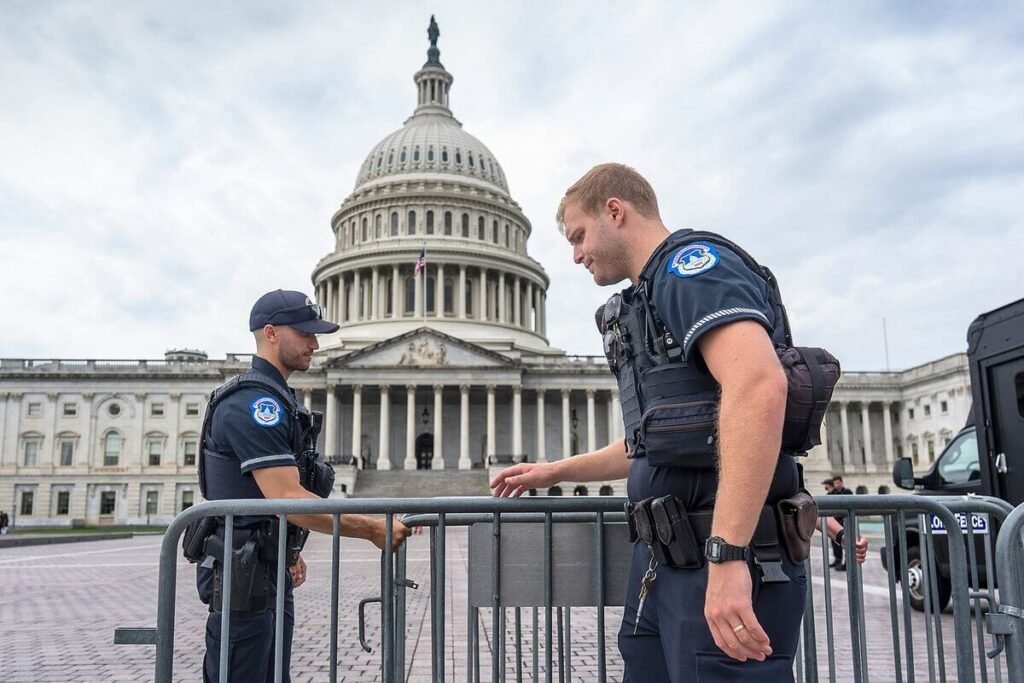The federal government has officially shut down as a deadlocked Congress failed to pass a funding measure to keep the lights on at the Capitol. Nobody knows what will happen next in this weekslong stalemate between Republicans and Democrats over enhanced Obamacare subsidies. This marks the first government shutdown since 2019, leaving millions uncertain about their future. Leaders from both parties remain privately and publicly adamant that the other side should be blamed for this funding lapse.
Both sides insist they won’t agree to extend the current funding beyond seven weeks and refuse to make major concessions without lending their votes in the Senate. The SHUTDOWN BEGINS at midnight today after no short-term funding bill passed through chambers. WHAT COMES NEXT remains unclear as lawmakers will reconvene Wednesday morning to vote on the same two bills rejected last night—Democrats demanding health care provisions while Republicans hold firm. AGENCY PLANS reveal every federal department and agency has procedures for operating during a shutdown, with countless federal employees being furloughed or required to work without pay as President Donald Trump has threatened to impose mass layoffs on federal workers.
Congressional Deadlock and Negotiations
Thune spoke privately with several Democrats for extensive lobbying, yet Shaheen decided to vote against forcing talks on ACA subsidies to the negotiating table. Senior Democrats held conversations about their best approach while cracks begun to show in the Democratic party’s stance. Republicans and Democrats remained adamant as leaders from both parties privately contemplated moving forward, though publicly they blamed each other. Weakening positions emerged when members flipped their votes after final deliberations. Two Democratic senators seriously contemplating their floor strategy eventually backed different positions, while Fetterman criticized the party’s strategy in this shutdown fight.
Murkowski believes room exists to negotiate on the impending cliff of premium tax credits, making her a potential dealmaker. The GOP’s plan for a funding plan again failed to yield results as Schumer remained adamant. Senators Jeanne Shaheen and Maggie Hassan from New Hampshire voted differently after cast vote deliberations with Senate Republican Leader John Thune. Hirono expressed feeling hopeful yet doubtful that any deal could build momentum. People interested in a quick end must be willing to talk about ways to accomplish compromises, though the American people face uncertainty. GOP leaders insisted they’re anxious for an off-ramp from this looming crisis. Apparently the GOP doesn’t care about constituents who face higher health care costs when subsidies expire at year’s end (read more).
Main points from the congressional deadlock:
- Thune lobbied Democrats.
- Shaheen opposed ACA subsidy talks.
- Party unity is cracking.
- Some senators flipped votes.
- Fetterman criticized Democratic strategy.
- Murkowski open to ACA negotiations.
- GOP plan failed; Schumer held firm.
- Public faces uncertainty as subsidies near expiration.
Democratic Party Division
Senate Minority Leader Chuck Schumer faces mounting pressure from members who remain divided over yielding to the GOP pressure campaign. Some Democratic party insiders argue that accepting a seven-week funding bill could allow time to negotiate later, though others view any concessions as politically unacceptable. The New York Democrat maintains his position is plain and simple: no discussion without reversing harmful cuts.
Internal fractures emerged as conversations revealed nine Democrats might cross over if leadership offers any guarantee on healthcare provisions. This subject has become increasingly contentious, with members unhappy about being caught between GOP demands and base expectations. The party struggles to present unified messaging while Republican leaders exploit these divisions, making each day more challenging for Democratic strategists navigating this impasse.
Healthcare Subsidies Issue
Obamacare subsidies face enhanced scrutiny as the deadlocked Congress battles over health care provisions. Democratic Sen. Catherine Cortez Masto and Sen. Angus King pressed for stability while millions worry about losing coverage. The White House warns of permanent damage if negotiations fail, making healthcare central to this crisis.
Senate leaders declared they would fight hard to protect access for people with disabilities. Medicare and Medicaid payments remain uncertain as the budget office monitors distribution channels daily. Senators from Nevada, Maine, and Pennsylvania vowed that working people shouldn’t pay the price for political gridlock.
Political Blame Game
GOP Sen. Josh Hawley appeared visibly exasperated while speaking to CNN about the blocked bill. The partisan accusation intensified as Democratic Sen. John Fetterman told reporters he was thinking long and hard about how to move forward. Sen. Sheldon Whitehouse expressed being concerned about a madman in charge, suggesting who should be held responsible. This answer seemed plain and simple to some caucuses within the Democratic ranks.
Tonight, there was little evidence of movement toward resolution as both sides ramped up threats. The GOP bill from Tuesday night failed to gain traction, with Democrats refusing to sign off. Some wanted to permanently shrink the size of certain programs they deemed harmful. Others feared growing concern over damage to the country if positions weren’t reversed. The force of uncomfortable political realities made next steps unclear for everyone involved.
Federal Employee Impact
Working through a government shutdown means federal employees face immediate furloughed status without clear timelines. President Donald Trump has threatened to impose mass layoffs across federal workers, creating unprecedented anxiety. The federal department and agency must follow strict procedures during this crisis. Many federal employees cannot work while operating under shutdown conditions, affecting Capitol operations fundamentally.
Officially, the funding measure collapse leaves workers vulnerable as the federal government struggles to keep lights on. Nobody knows what will happen next after this weekslong stalemate. The first government shutdown since 2019 shows how politicians refuse to provide major support. Without a short-term funding bill, the situation worsens today at midnight when SHUTDOWN BEGINS.
Key Impacts of the Government Shutdown on Federal Employees:
- Federal workers face furloughs
- No clear timeline for return
- Trump threatens mass layoffs
- Shutdown creates high anxiety
- Agencies follow strict protocols
- Many employees barred from working
- Capitol operations are disrupted
- Funding measure has failed
- Government struggles to operate
- Weeks-long political stalemate
- First shutdown since 2019
- No major political support
- Shutdown starts at midnight today
Services Impact on Americans (Government Shutdown)

When federal operations shrink amid a government shutdown, Americans face impacted access to critical services across multiple sectors. Essential workers in healthcare and security continue their duties without immediate compensation. Non-essential functions face shuttering, leaving citizens navigating deep uncertainty about everyday assistance. Lower-income households and middle class families depending on subsidies or assistance programs may discover their coverage suddenly interrupted. The potential effects ripple through communities as hundreds of thousands of staffers stop processing applications, answering questions, or maintaining routine operations that keep society functioning smoothly.
The impasse creates a prolonged period where people can’t predict when normalcy returns or what happens next. Federal employees face furloughs while wondering how long this disruption lasts. Services ranging from national parks to loan processing become unavailable, forcing Americans to adjust plans and brace for inconvenience. Each day without resolution adds to the damage, affecting everything from passport processing to environmental inspections. Citizens experiencing these disruptions often feel caught between partisan battles, watching as political blame games overshadow their practical needs for functional government operations and reliable public programs.
Members of Congress Still Get Paid
Congressional salaries remain funded through permanent authorization, unlike 750,000 federal workers facing unpaid leave. This plain reality sparks accusation of hypocrisy during impasses, as lawmakers relent rarely on self-protection. Past shutdowns revealed the harmful high price citizens pay while charge holders keep getting their checks. The madman thinking persists: those creating crisis stay paid.
Evidence shows roughly $400 million annual Congressional Budget Office calculations confirm legislative compensation continues regardless. Members earn substantial sums even when government operations shut down, a movement some caucuses oppose. Democratic voices like Sen. Sheldon Whitehouse and John Fetterman have questioned this inequity before reporters. Yet asking for change meets resistance, leaving federal employees told they’re essential but treated otherwise during budget crises.
Key Takeaways on Congressional Pay During Government Shutdowns:
- Congress members still receive pay during shutdowns.
- Their salaries are funded by permanent authorization.
- 750,000 federal workers may go unpaid during shutdowns.
- Critics call this hypocritical and unfair.
- Shutdowns hurt citizens, but lawmakers’ pay continues.
- Estimated $400 million annually goes to Congressional pay.
- Some lawmakers, like Sen. Whitehouse and Sen. Fetterman, have voiced concern.
- Efforts to change the policy face strong resistance.
- Federal employees are labeled “essential” but unpaid.
Public Contact Request on Government Shutdown
During uncertain times when federal operations face disruption, reaching out becomes essential yet complicated. Citizens attempting to contact their elected officials discover that office staff numbers are drastically reduced, leaving essential inquiries unanswered. Call centers experience overwhelming demand while limited personnel struggle to maintain basic response systems. This situation creates frustration as constituents seek guidance on pressing matters affecting their daily lives.
Phone lines remain technically operational, but wait times extend indefinitely without adequate support. Email systems accumulate thousands of unread messages as furloughed workers stay home, unable to perform their duties. Website portals display outdated information, leaving people searching for answers in vain. The breakdown in communication channels highlights how quickly public service deteriorates when government funding expires.
Read More Articles Here:
Australia vs England Women Highlights: Fierce Rivalry
Women’s Cricket World Cup: Emotional Wins That Inspire
Karachi Braces for Intense Heatwave as Temperature Hits 40°C
Conclusion
Democrats now face tougher decisions as Wednesday morning approaches, with state leaders grappling to reopen government amid federal chaos. GOP funding plan supporters remain steadfast while Democratic voices like Sen. Sheldon Whitehouse and Democratic Sen. John Fetterman struggle finding movement. After weeks of asking both caucuses to move forward, the madman rhetoric hasn’t yielded progress over critical services.
Americans witnessing this shutdown impact understand the plain reality: jobs, premiums, and monthly stability hang precariously. From air traffic controllers to Transportation Security Administration employees facing staffing shortages, the variety of ways citizens feel this crisis proves overwhelming. Veterans needing critical services, senior citizens awaiting Social Security payments, and families dependent on Obamacare policies—every sector suffers when members of Congress remain protected by Article I, Section 6 while ordinary Americans bear consequences.
Zainab Farooq is a dedicated reporter and celebrity wealth analyst with Pakistan Coverage, committed to bringing readers timely and accurate information across diverse topics. With a passion for storytelling and fact-based reporting, she covers everything from celebrity net worth insights and entertainment industry analysis to local Pakistani developments and global trends, ensuring readers stay informed about the stories that shape our world.




